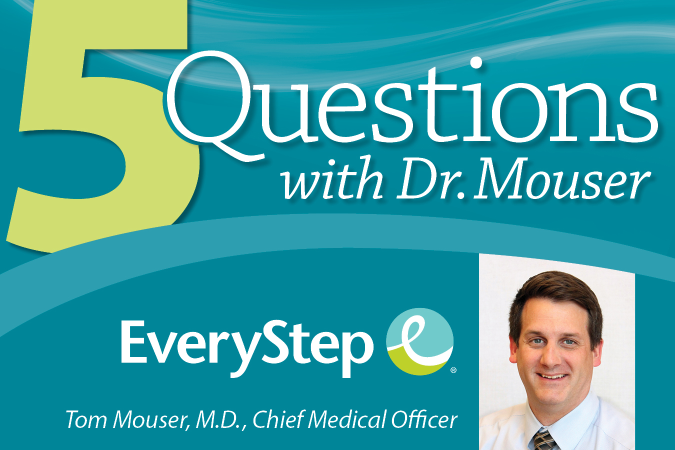June 20, 2023
Three Questions to Begin a Health Discussion with Aging Parents

Q: Sometimes it’s difficult to talk to aging parents about their health needs and wishes. How can you begin these important discussions?
Dr Mouser: The most important thing is to always approach it from a standpoint of how much you love them and how much you respect them and want to honor them. And because of that, you want to talk to them about some things that can be uncomfortable. That’s important because parents often respond best when they understand that they're helping their kids.
Talking about health care can seem very scary. What exactly do you ask them? And if you ask certain things, will that offend or scare them? In general, some of the key questions to ask to have very little to do with medical specifics and more to do with values and goals. There are questions that children can ask their parents to help set up the situation:
- “What are your most important goals if your health situation worsens — what are the things that are sacred to you?” For instance, your loved one might say, “Under no circumstance would I ever want to live in a nursing home, because if I can't live at my own home and have independence, that wouldn't be good living for me.” Knowing that would help guide you through scenarios such as a critical illness that required aggressive treatment and nursing care for the rest of their life. You would be able to know mom would not want that and you could work with the doctor to focus on comfort care, and not heroic measures that that could result in her being unable to stay in her home.
- “What are your biggest fears and worries about your health in the future?” You can get a really good sense of what somebody values as they start to reflect on the things, they're afraid of and worried about. For instance, if a loved one says they’re worried about getting injured and not being able to live at home, you could have the home assessed for safety to prevent a fall and a hip fracture. I often ask what abilities are so critical to your life that you can't imagine living without them. I've had patients say, “If I can't watch football and eat ice cream — don't do any heroic things to keep me in a state that wouldn’t allow me to do that.” Everybody values things differently.
- “How much are you willing to go through for the possibility of living longer?” In other words, are you willing to go through quite a bit of suffering or invasive procedures or time in the hospital? Getting the answers to those things can set you up downstream for probably any scenario that could play out.
Click Here for a Downloadable Care Planning Packet
Q: Is there any research that shows asking these questions is helpful?
Dr. Mouser: There is a community in Lacrosse, Wisconsin that started a movement called Respecting Choices. It revolutionized health care in that community and improved the satisfaction and quality of care to the whole community because they had planned ahead for individual scenarios. Whether it was a 20-year-old planning for what would they want done if they were in an automobile accident, to an elderly person very near end of life, residents were able to plan for the things that would be important to them if their health failed. So, we know these conversations are powerful.
EveryStep offers free, downloadable advanced care planning packets, which include cues for starting the conversation with family members and documenting one’s wishes. For details, click here.
Dr. Thomas Mouser, MD, is chief medical director with EveryStep. He is dually board certified in internal medicine and palliative care, having completed his residency at University of Iowa – Des Moines and a fellowship at Stanford University. Dr. Mouser has spent countless hours at the bedside of those with serious illness and chronic disease. In his role, he helps hospice, home care and palliative care patients and their families navigate complex medical decisions as guided by the patient’s goals of care. Dr. Mouser’s fellowship training provided for an expertise in advanced symptom management and communication when working with those with high burdens of suffering. He is passionate about helping his patients reach their best quality of life so they can live life to the fullest.